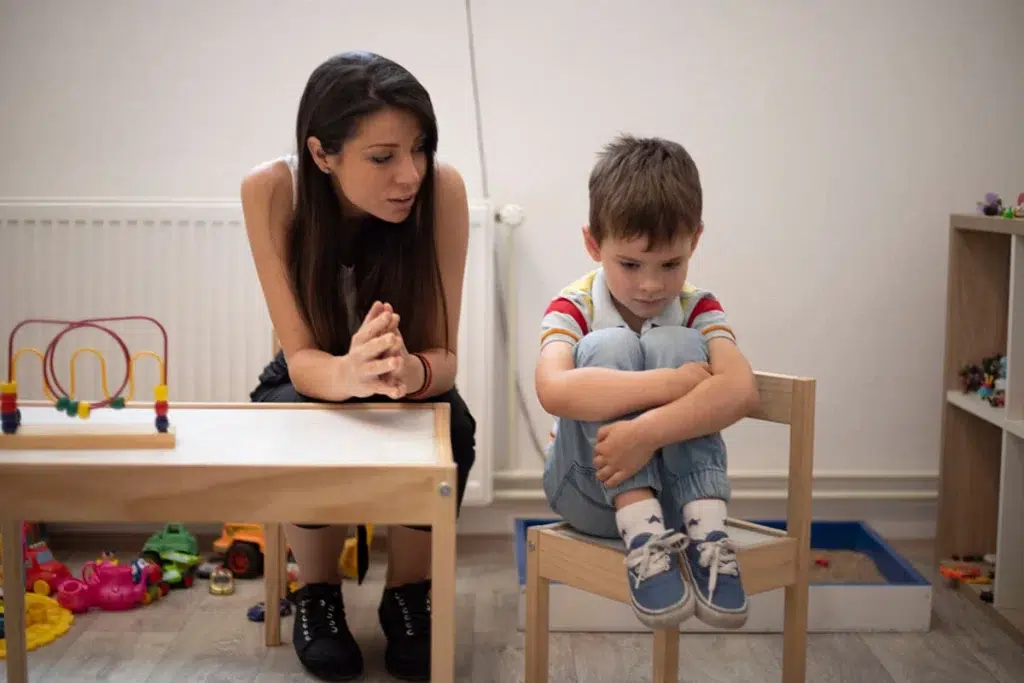What is a Learning Difficulty?
Learning difficulties are neurological challenges that can affect reception, processing, storage, and analysis of information in the brain. A learning difficulty can impact the ability to acquire language (reading, writing) and the development of math skills.
Therefore, learning difficulties are usually detected during the school-age years. In some cases, they may remain undiscovered until the individual attends college or joins the workforce.
Unlike an intellectual disability, a learning difficulty only impacts the development of specific learning skills and doesn’t indicate the individual’s intelligence level.
Alternative strategies can help individuals with learning difficulties to overcome the challenges of traditional education methods and achieve academic progress.
Learning difficulties vary in severity – some are mild, but some can seriously hinder a person’s academic success.
Both children and adults might require support for the specific skill impacted by their learning difficulty to thrive in the classroom or the workplace.
Types of Learning Difficulties
Learning difficulty is an umbrella term for neurodevelopmental conditions that affect an individual’s ability to acquire several types of skills.
Below are the most common types of learning difficulties, with some of their hidden talents, too!
ADHD
Attention Deficit Hyperactivity Disorder is a consistent pattern of hyperactivity, impulsivity, and inattention. While impulsive behaviour and hyperactivity are fairly noticeable signs, ADHD may go unnoticed if a child mainly struggles with attention issues. On the flip side, people with ADHD are incredibly creative, curious and many become entrepreneurs when offered the right support!
Dyslexia
This condition affects various areas of language acquisition, such as reading, spelling, writing, and speech. Dyslexia can occur on its own or combined with another learning difficulty. People with dyslexia are also great problem solvers and big-picture thinkers.
Dyspraxia
An individual with dyspraxia may experience impairment of motor skills and difficulty maintaining balance. Dyspraxia has no impact on a person’s intelligence, but it can make it hard for a school-age child to hold a pen or pencil and therefore disrupt handwriting. This learning difficulty sometimes goes hand in hand with dyslexia. People with dyspraxia are great strategic thinkers!
Dyscalculia
Dyscalculia is a learning difficulty that explicitly targets the ability to acquire math skills. This condition makes it difficult for a person to count, comprehend numbers and other math symbols, tell the time, and grasp math concepts in general. Whilst numbers might not be their thing, people with dyscalculia are creative, intuitive and can be amazing with words.
Dysgraphia
This condition is characterised by the impairment of fine motor skills related to written expression. A person with dysgraphia may find it challenging to spell correctly, compose written sentences, leave space between words, and think and write simultaneously. However, people with dysgraphia can make great verbal story tellers, holding people’s attention for long periods of time.

Signs and Symptoms of Learning Difficulties
In many cases, individuals with learning difficulties start manifesting early signs as school-age children. However, these conditions can also remain undiagnosed and affect people’s performance in higher education and the workforce. Left unnoticed, a learning difficulty has the potential to lead to poor confidence and mental health issues.
Signs of Learning Difficulties in Children
Parents and teachers usually notice early signs of a learning difficulty or learning disability in the first 2-3 years of school. This is a crucial period when children acquire basic reading, writing, and math skills in the classroom. A school-age child with a learning difficulty may:
Dislike or find it difficult to perfect writing, reading, and math skills
Struggle with spelling or rhyming common words
Have trouble spotting sounds and syllables in a word (for example, ‘p’ in ‘apple’)
Find it hard to count and link numbers to their associated words (for example, ‘3’ and ‘three’)
Have a lack of confidence about schoolwork
Signs of Learning Difficulties in Adults
Symptoms of learning difficulties in adults might be more subtle and harder to detect. Here are the most common signs that can might indicate challenges for college students or adults in the workforce:
Difficulties in reading and writing (for example, individuals may have trouble writing an email, filling out a form, or reading complex sentences)
Trouble maintaining routine and consistency in interpersonal relationships (procrastination, postponing tasks and social events)
Issues with memory and focus
Issues with following directions, problem-solving, and critical thinking
Struggles with basic math skills (counting, telling the time, understanding sums and sequences)
Adults with Learning Difficulties
Although the common perception of learning challenges is related to childhood, people usually don’t outgrow neurodevelopmental differences as they age. These differences remain a part of one’s life throughout adulthood.
In some cases, adults may figure out their condition after seeing their child coping with the same issues they faced. A significant percentage of adults with learning disabilities and difficulties often live their lives undiagnosed.
An undiagnosed learning disability or difficulty in adults may limit educational success and career opportunities. Without proper support or reasonable adjustments, individuals interpret their learning struggles as personal failure, internalising feelings of shame and guilt.
Undiagnosed learning disability or difficulty in adults often leads to mental health issues, such as:
Anxiety
Depression
Low self-esteem
Access to tailored support from professionals who can provide specific learning strategies is crucial in ensuring a better quality of life for people with a learning difficulty.
Learning Difficulties Assessment
If you notice significant struggles with your child’s basic learning skills, the first thing to do is talk to their teacher. Ask your child’s teacher about your child’s progress with separate areas of learning (maths, reading, writing) and their general behaviour in the classroom.
If the school notice a particular learning challenge, they should provide your child with additional literacy or numeracy support.
If the issues persist after the initial school support program, it’s a good idea to seek a formal assessment for learning difficulties by a GP, paediatrician or psychologist.
Your GP should refer you to an adequate health professional for more detailed tests and assessments, such as:
Psychologist
Pediatrician
Speech pathologist
Audiologist
These professionals may identify the specific area of learning a child struggles with – language development, motor skills, or focus and attention. They can further suggest how to proceed with coping, treatment, care, and support.
Difference Between Learning Difficulties and Learning Disabilities
Although these terms are often used interchangeably, learning disabilities and difficulties are very different. A learning disability (or intellectual disorder) affects the individual’s learning capacity in every area of life.
Unlike learning disabilities, a learning difficulty only impacts a specific area of learning, whilst the intelligence of the individual is not affected.
For instance, Down’s syndrome is classified as a learning disability because it influences all aspects of life, including the overall intellectual capacity and physical health of the individual. On the other hand, dyslexia (a learning difficulty) only affects a specific area of abilities related to language acquisition, such as reading, writing, and spelling.

Global Developmental Delay
Global Developmental Delay (GDD) is a term that covers a wider range of neurological differences that might mean a child reaches developmental milestones later than their peers. This can include speaking, walking, and the ability to interact with family members or other children.
GDD can limit a child’s ability to develop various skills, such as:
Interpret social cues and social awareness
Understanding and retaining information
Restrict their problem-solving abilities
Respond appropriately to others
Gain personal independence and self-care skills
Navigating their environment through movement
Prevent them from developing personal and social independence

Studies have shown that a child’s family history can affect their development.
Although a child with GDD may eventually be diagnosed with a something specific, this isn’t always the case.
Support for People with Learning Difficulties
Getting diagnosed with a learning disability or difficulty can be tough for the people and their families. Parents might be worried about their child’s education prospects, whilst adults may feel relieved to understand why they’ve struggled with certain elements of their lives.
Regardless of the circumstances, students and workers with learning disabilities and difficulties benefit from tailored learning strategies to achieve their full potential.
Support workers are trained to assist children and adults with learning difficulties and improve their performance in all aspects of life. They can employ a program with several types of lessons, such as:
Speech therapy – specialised lessons for individuals with dyslexia and other language-based impairments
Occupational therapy – treatment focused on improving motor skills of the child
Educational therapy – help for school-age children with basic subjects (reading, writing, speaking, maths)
Group/play therapy – teaching children skills through friendly interaction with their peers
Sensory learning program – teaching through stimulation of all senses
How Leaf Complex Care Offers Support for People With Learning Difficulties?
At Leaf Complex Care, providing tailored care for every child and adult with a learning disabilities or difficulty by our skilled support workers is more than a job – it is our mission. Our support workers approach every individual with kindness and imprint empathy, patience, and dedication in their teaching strategies.
Apart from offering academic accommodation for your child, we also prioritise their mental health and sense of self.
Looking for a Career in Helping People with Learning Difficulties?
If you are an aspiring support worker who wants to leave an impact on the lives of people with learning disabilities and difficulties, Leaf Complex Care is the right place for you.
We offer you free training, recognition of your achievements, and an opportunity to advance your career in a compassionate environment. Become a part of the Leaf family and join our mission of removing the social barriers imposed on individuals with complex needs.


















